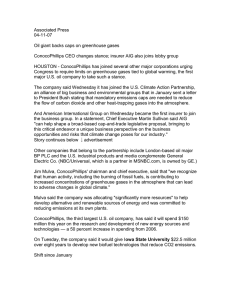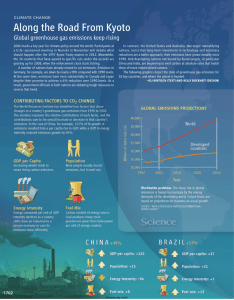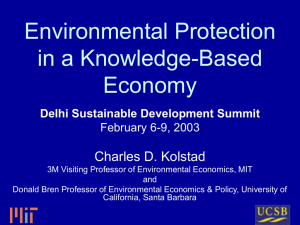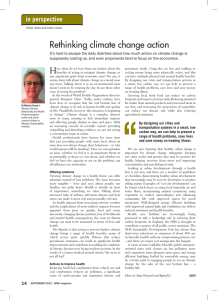Chicago Tribune, IL 04-11-07 Oil chief calls for emissions caps
advertisement
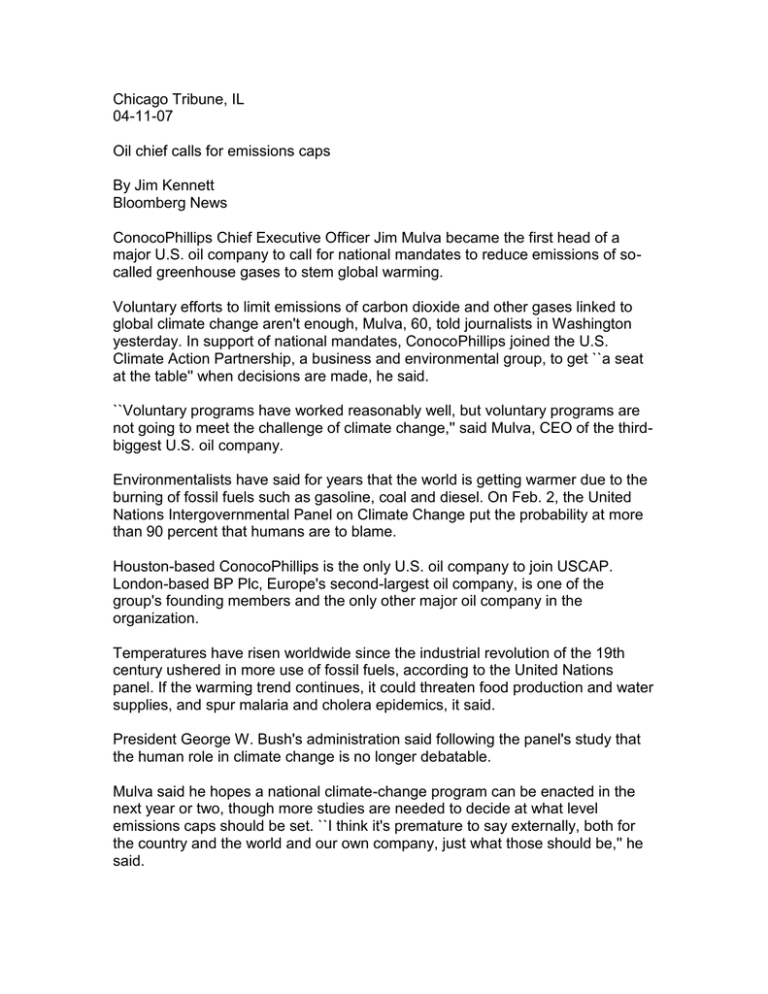
Chicago Tribune, IL 04-11-07 Oil chief calls for emissions caps By Jim Kennett Bloomberg News ConocoPhillips Chief Executive Officer Jim Mulva became the first head of a major U.S. oil company to call for national mandates to reduce emissions of socalled greenhouse gases to stem global warming. Voluntary efforts to limit emissions of carbon dioxide and other gases linked to global climate change aren't enough, Mulva, 60, told journalists in Washington yesterday. In support of national mandates, ConocoPhillips joined the U.S. Climate Action Partnership, a business and environmental group, to get ``a seat at the table'' when decisions are made, he said. ``Voluntary programs have worked reasonably well, but voluntary programs are not going to meet the challenge of climate change,'' said Mulva, CEO of the thirdbiggest U.S. oil company. Environmentalists have said for years that the world is getting warmer due to the burning of fossil fuels such as gasoline, coal and diesel. On Feb. 2, the United Nations Intergovernmental Panel on Climate Change put the probability at more than 90 percent that humans are to blame. Houston-based ConocoPhillips is the only U.S. oil company to join USCAP. London-based BP Plc, Europe's second-largest oil company, is one of the group's founding members and the only other major oil company in the organization. Temperatures have risen worldwide since the industrial revolution of the 19th century ushered in more use of fossil fuels, according to the United Nations panel. If the warming trend continues, it could threaten food production and water supplies, and spur malaria and cholera epidemics, it said. President George W. Bush's administration said following the panel's study that the human role in climate change is no longer debatable. Mulva said he hopes a national climate-change program can be enacted in the next year or two, though more studies are needed to decide at what level emissions caps should be set. ``I think it's premature to say externally, both for the country and the world and our own company, just what those should be,'' he said. It also isn't clear what form a nationally mandated program should take, Mulva said. The so-called cap-and-trade concept, whereby companies trade emissions credits, has growing international acceptance, while a carbon tax is more transparent, he said. Any system should be clear and balanced, encourage energy efficiency and clearly communicate the cost of lowering emissions to consumers, Mulva said. Other oil companies have acknowledged claims that humans are responsible for global warming. Exxon Mobil Corp. in February called for action to combat global warming and the ``serious'' damage it could cause to the environment and the economy. As the world's largest oil company and refiner, Exxon Mobil was attacked by environmentalists throughout the 1990s before softening its position on climate change. Exxon Mobil hasn't said whether it endorses or opposes a federal emission cap. Governments should impose more rules to limit emissions of gases blamed for global warming, Royal Dutch Shell Plc CEO Jeroen van der Veer said on Feb. 1. ``Governments, plural, should make international frameworks'' to limit carbon dioxide, he said then. ``CO2 will play a major role in our industry, and we have to develop more technology.'' ConocoPhillips will increase spending on research and technology aimed at alternative and renewable fuels, Mulva said. Of the company's $400 million dedicated this year to research and development, about $250 million is earmarked for traditional oil and gas projects. The company budgeted $150 million for alternatives such as ethanol and unconventional energy sources like shale oil, he said. This year's spending on alternative energy research will be 50 percent higher than last year's. Mulva said he plans more increases. Yesterday, the company said it is establishing an eight- year, $22.5 million biofuels research program at Iowa State University. Biofuels include ethanol made from corn starch and biodiesel made from soy beans. Similar programs are expected to be unveiled in the coming months, Mulva said. Many industrialized nations have already begun taking action by setting caps on emissions. The 27-nation European Union agreed March 9 to unilaterally reduce greenhouse gas emissions by 20 percent, and proposed a 30 percent cut if developed nations followed suit. The effort is in addition to existing commitments under the Kyoto Protocol, a 1997 treaty involving 35 countries that agreed to cut emissions by a combined 5 percent from 1990 levels by the 2008-2012 period. The U.S., the largest emitter of greenhouse gases, and Australia didn't ratify the treaty, and developing nations such as India and China aren't subject to emissions reductions. --With reporting by Tom Cahill and Stephen Voss in London..



